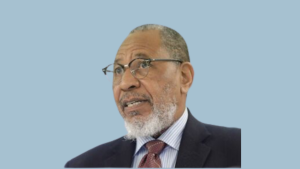“We need to look at the early warning systems in place and aspire to attain food security.”
Dr. Fatima Denton is the Director of the UN University Institute for Natural Resources in Africa (UNU-INRA). Dr. Denton’s research has centered on climate change adaptation, focusing on resilience systems in agriculture, water, and energy, principally in Africa. She works on the intersections of adaptation and mitigation, focusing on transition theories, not least green transitions, stranded assets, and minerals and extractives.
African economies are facing very high levels of inflation due to price increases for several basic goods and food, following the invasion of Ukraine. What is your analysis of the impacts of this crisis and how might it present an opportunity to rethink several policies, especially agricultural policies in Africa, but also more largely the broader development models being followed?
My analysis of the crisis, or the poly-crisis as it has been called, can be approached from several perspectives. We have seen a number of cascading impacts across the continent: rising costs of both food and fuel and strong inflationary pressures. One of the most fundamental problems is that African economies are import-driven, as many goods are not produced at home. Globalization has had major impacts on how we produce, consume, and trade. The crisis is therefore coming from several angles, with implications for our food systems, how we produce energy, and what we do with it. There are multiple impacts also at the societal level because of the rising cost of living everywhere. Much of Africa has a land-based economy reliant on agriculture. The reliance on agriculture, combined with an import-driven development model and production system inherited from colonial times, has made life more difficult. Prices are going up and many people are unable to get by, which has other types of hardship-related implications – social, economic, and even political - because there are voices now that can no longer be contained. The suffering is unprecedented.
People have different ways of analyzing our debt burden; some people say it is due to maladministration, and others say that we are locked into these debt cycles. We spend so much time trying to negotiate our way out of debt, but we are locked in a vicious cycle because it can take 120 years to pay off some of these debts. And you are paying both the debt and also the cost of servicing the debt. I was talking to a senior policy official and he contrasted the debt situation to having a mortgage. The difference is that when you take out a mortgage, you can trace the assets because you have acquired a house. But debts in Africa are not traceable in the same way. It’s difficult to point to what you paid for, some of them are for social infrastructure, but it’s often hard to trace where the money has gone.
To come back to the question of the poly-crisis, how do you move away from this immediate crisis to think about long-term resilience planning? There are some structural problems that Africa has – critics would argue that some of them are man-made, and self-imposed from years of mismanagement, corruption, and maladministration. Regardless, we need to seize the moment, do some horizon scanning, and think about how we get out of this situation. This continent is home to more than 60 percent of the world’s arable lands, and yet economies are greatly affected by huge dependence on Ukraine and Russia, for maize, wheat, oils, and fertilizers. This dependence has created problems for countries unable to rely on their own productive resources. We must reel back from this current catastrophic scenario, where people suffer from huge food price hikes, and get production and consumption systems well-aligned. The region is strongly import-driven, and it will remain so unless these structural problems are addressed. They have been worsened by our impossible debt situation, so countries must now find ways to recalibrate their debts. They could engage in a different way, to start producing fertilizers and food. There are two or three countries in Africa that could become like Russia and Ukraine, in terms of becoming large-scale agricultural producers and exporters. Today, we punch well below our weight. Already, Ethiopia is positioned to be one of the leading countries in terms of wheat production, and Zimbabwe is pushing ahead with maize as the dominant crop. Wheat and maize could become the staple crops of two or three African nations, sufficient to meet the continent’s needs, despite the continent’s current agricultural and climate-related challenges. Cereal supplies from Russia and Ukraine would then become completely redundant.
Obviously, it is important to do a lot more with our agricultural systems and take resilience planning much more seriously, but it also means looking again at some of the tools and infrastructure needed for production. Take the production of fertilizers. Production and consumption should not be happening thousands of miles away from where the real needs are. Boosting our battered food systems, these for me should be a top priority for getting out of this poly-crisis. I’m not saying oil and gas are not important, but people cannot eat oil and gas, they need their staples.
Although Africa is on the frontline, with constrained capacity related to how it adapts to climate change, its problems are not insurmountable. We need to look at the early warning systems in place and aspire to attain food security. A lot of this means going back to basics, such as how we plan agricultural land systems, and think through the technology and infrastructure we need. Even if we produce, if we don’t have infrastructure in place so our goods are not mobile, they do not travel very far. The African Continental Free Trade Agreement is envisaged to be the largest trading bloc in the world, bringing together more than a billion people with a market worth trillions of dollars. But how do we get away from all the non-tariff barriers which block the movement of goods? How do we create strategic sites for production within the continent, and have Zimbabwe replace Ukraine, and Ethiopia replace Russia? A lot has to do with strategic decision-making, from a regional power base. What the EU is doing today goes back to that regional approach, the power of an economic grouping with political decision-making, able to recenter, rethink, and recalibrate. While we have regional groupings in place, we have to become more strategic. Let’s go back to the African Union Commission or Regional Economic Communities, to recalibrate their actions and decisions to get the benefits of digitalization to address some of the logistical challenges mentioned above. How might we empower our small-scale enterprises, our micro and medium-sized enterprises, to benefit more from tourism, for example? The problems are all connected and also very solvable.
We have been talking for some years now about green transition, green industrialization, and the importance of African countries leaping ahead in terms of not following the fossil fuel energy pathway that many countries in Europe followed. Given the Russian invasion of Ukraine, and the impact it has had on many supply chains, how do you see progress now with the green transition and the roll-out of renewables? How does a country like Ghana position itself, with one foot in the fossil fuel sector and one foot in the renewables sector? Looking across the Continent, where do you see progress? What ambitious steps might we see at the Africa Climate Action Summit in Kenya in September?
Let me answer this question slightly differently. First of all, there is no question whatsoever that it is in Africa’s best interests to design a strategy in the long term to leave fossil fuels behind. This will take away the costs and implications associated with path dependency. The continent is still heavily reliant on coal, oil, and gas, and has been so for a long time. But fossil fuels have contributed little to the region’s wealth and economic progress. Extraction remains inevitable over the next few years, but we need to get out of it, to save ourselves from further land and resource degradation, and to rehabilitate land. Extractive economies might maximize profit, but we need to leave them aside and work towards a regenerative economy: an economy that can regenerate, repair, replenish, and grow.
But let me tackle the question that you ask - where is the progress, who are the front runners, in this move towards green transformation? I would like to answer that differently because there are clear front-runners who understand the challenges, and we can work together toward a coalition of the willing. For me the most important question is not “who are the front runners”, but how do these front runners define their own net zero, how do they define their own transitional pathways? There is a quote by Chinua Achebe, “Although the lions have their own histories, the hunt will always be glorified by the hunter…”. We need to ask - whose net zero are we gravitating towards, whose transitions? What does net zero mean for different African countries?
Having been part of this scene for the past 20-plus years, net zero seems to be very reductionist because its central tenet is around temperature control. Each country is submitting its report card on reducing its emissions for the sake of the planet, but the temperature goal does not get many people overly excited. And a focus on front runners can be a divisive strategy because the mitigation burden is then turned into a responsibility burden of “let’s see who acts first”. It idealizes “the champion”, but this challenge is not about idealizing the champion, it is about understanding your growth trajectory. How can you, from your own vantage point, identify the changes that will take you to net zero? This needs to come from your own perspective, not one that is foisted on you. You need to understand that the production of maize, wheat, and of nitrogen fertilizers matters. Making these a priority within your own net-zero pathway is what countries should be defining. Don’t rush hastily towards a mitigation bandwagon, even if that has development co-benefits. It’s clear that if you expand access to renewable energy, everybody wins, but renewable energy expansion is someone else’s agenda. From a global climate perspective, this is seen as something our continent needs to back with a great deal of urgency because not doing so puts the planet in further peril, which imperils all of us.
For me, it should not be a discussion of who are the “front runners” because that reinforces power and competition. While a few countries know what to do, the continent as a whole is still figuring out how to go about it, and what kind of infrastructure to put in place. If you pit countries against one another in terms of who are the “front runners”, it’s not very helpful or practical. We all need to move in the direction of a common project. We must recognize that extractive industry can bring temporary wealth creation, but it cannot be a permanent base for creating wealth. Past experience shows it is a means to create an elite economy, which shuts out a vast number of people. The history is well-known, and it takes radical leadership to transform these patterns. The ‘predation’ that we witness would just take another form. For me, you can identify countries like Ghana that are making progress and have got a number of mitigation strategies they are putting in place. They are even looking at what to do with hydrogen as a source of fuel, and asking how to produce lithium-ion batteries. Countries such as Namibia are looking at hydrogen and green technologies with the support of countries such as Germany in the global North. Senegal is also making progress toward green development. These are all front runners, but what we need is for all countries to take a determined step in this direction. Reducing emissions is important, however, but our focus should go beyond conflating everything to a single temperature metric - we should look at associated development benefits and how to secure these. We know there are major implications for Africa’s economy if we hit 4 degrees, rather than keep warming down to 1.5. But temperature is not foremost in people’s minds; most of all it’s how to secure their land, ensure their food security, avoid people taking perilous journeys away from the Continent, risking their lives because they are not able to eke out a living at home.
For me, Africa must find its central starting point in the net zero conversation, by writing its own story about what it can gain from net zero. Africa’s leaders must take a bold step toward framing the agenda because very often the big noise around net zero is coming from the global arena. The dynamics need to shift, and the solutions come much closer to home. While we need traction at the global level, the place for action needs to be so much closer to the ground. For too long, the debate has happened at a global level, while national actors are left ‘limping’ along because they are omitted from the conversation. They struggle to plug in so they can develop their own innovative solutions, starting with their own national development plans. This process of disempowering local entities is an old problem, which started during the colonial period, but it has left its mark. Right now, local and national climate voices need to be more audacious, and louder.
Today, the center of climate action is concentrated at the global level, around the annual COPs. But what happens after the COP? Everyone goes in their own direction, and the terminologies may not make sense when people reach home. We need to be able to give an action-oriented space to local actors, to bring the approach down-to-earth. Localization should be a critical benchmark of how we address the problem. I believe that we have centralised the debate so badly, we have emptied the energy and capacity from where action is needed most. Take the cyclones in Malawi just now. Can the global debate offer any solutions to Malawi at the moment…no! But if local authorities are given the space to use their ingenuity and strengthen support systems, using their indigenous knowledge, they are likely to come up with really helpful solutions which fit their context. Malawians should understand and have confidence in their own local systems and abilities right now because they are close to home. While they need international support, and solidarity is important for climate diplomacy, the power to design and decide needs to be brought back to the local and national levels.
What do you make of discussions around the “just energy transition”?
There needs to be a leveling up and shared understanding of just energy transitions for everyone. Again, it comes back to the issues that I was talking about before, in terms of localizing these narratives. We must ask - whose “just energy transitions” are you talking about? The global debate always directs the speed and direction of travel. Energy is an important frame to understand where we are going, and the region needs to get a lot more ingenious in terms of identifying Africa’s mitigation priorities. From my perspective “just energy transition” is very reductionist and largely focused on jobs. It means that carbon-intensive industries will have to shut down, and people will lose their jobs. Mines are being closed as we speak, in South Africa. Violence can arise due to these mine closures, and many women will suffer losses because they depend on revenue from the mines. Remember, the debate on just energy transitions has evolved from a North American context. What happens when these jobs are lost? How do you re-tool, and re-skill the workforce for a different pattern of work? Equity is core to the transition…it’s almost like the nervous system, it’s so critical and because it’s so intangible, it can be missed. We need to look beyond jobs.
At the United Nations University, we explore examples of “unjust transitions” to clarify what they look like. Take economies such as Mozambique, for example, which need to export to the EU and must adapt to the Carbon Border Adjustment Mechanism. The CBAM will tax carbon-intensive products and could mean that 54 percent of Mozambique’s aluminum exports to the EU will face a loss, estimated at almost $1 billion or 7 percent of the country’s $16 billion GDP. Mozambique needs some leeway so that it doesn’t end up losing a big chunk of its GDP, as a result of these new trade barriers. Ask yourself: how big is Mozambique’s overall carbon footprint, and is it fair that Mozambique faces a similar mitigation burden as an EU country? These are some of the unjust transitions we are exploring. A similar story could be told for Morocco, a country whose energy demand is growing rapidly. Currently, their emission-intensive energy systems mean that some products from Morocco will face a levy from the carbon border adjustment mechanism. South Africa is a further example of a country facing energy-related taxes, given its fossil fuel dependence, which means that workers could be left behind. We need to explore the different pathways for a just transition and localize its implementation. Most people in Africa do not speak in terms of just transitions and, when they do so, they come at it in terms of their own definitions of what it means to them. Part of making the transition happen involves enabling other definitions to emerge and bringing these contexts and examples into the mix to avoid blind spots and blind alleys. We’ll also need to devise new metrics, which are going to be fundamentally important if just transitions are going to have any substance.









